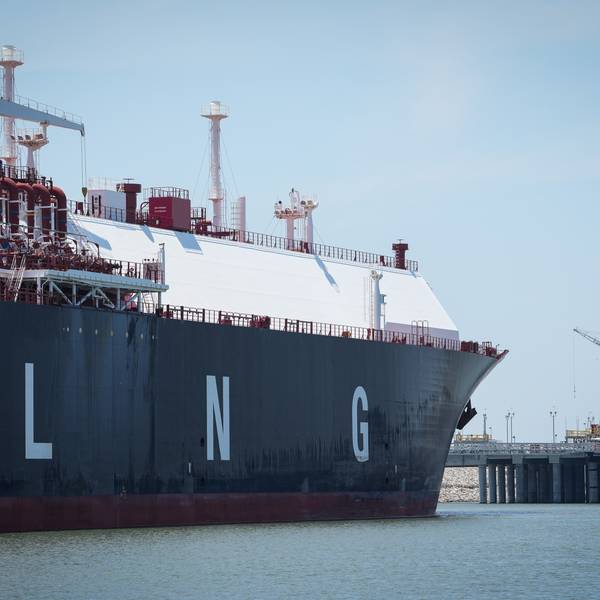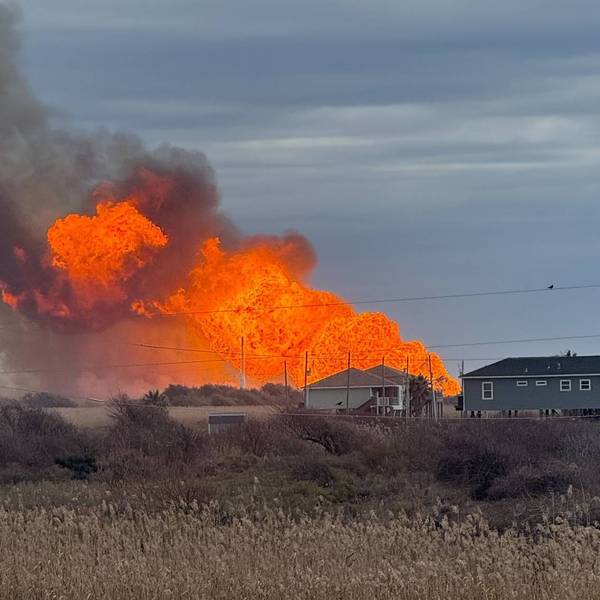In what the Sunrise Movementcalled a "disastrous decision," the Federal Energy Regulatory Commission voted 2-1 on Thursday to approve a certification for Venture Global's controversial Calcasieu Pass 2 liquefied natural gas terminal. The approval comes despite the fact that the company's first Calcasieu Pass terminal violated its air pollution permits more than 2,000 times during its first year in operation.
While expected, FERC's decision was widely condemned by climate justice advocates and frontline community groups. At the same time, CP2's opponents emphasized that the plant is unlikely to be built while the Department of Energy has
paused the approval of LNG exports while it considers their impacts on the climate, consumers, and local communities.
"A rubber stamp from FERC is business-as-usual for fossil fuel projects," Lukas Ross, climate and energy justice deputy director at Friends of the Earth,
said in a statement. "Thankfully CP2 has a long way to go and we intend to fight it every step of the way. No amount of lobbying will make this project anything other than a climate and environmental justice nightmare."
"We refuse to sink. We are going to fight them here. We are going to fight them at home. This is far from over."
Environmental groups say that CP2 is a "carbon bomb" that would emit 20 times more climate pollution over its lifetime than the
Willow oil drilling project in Alaska.
"CP2 is a climate catastrophe," the Sunrise Movement wrote on social media. "It would produce more emissions than 46 coal-fired power plants and spew air pollution into marginalized communities."
It is also a key test case for a massive LNG buildout that threatens to raise domestic energy prices and shatter national climate goals.
As 350.org and Third Act co-founder Bill McKibbenpointed out in a Thursday column following the approval:
There's a huge pool of frackable gas sitting in the Permian Basin of Texas. The only way to monetize most of it is to ship it to Asia, persuading the fast-growing economies there to use it instead of wind and sun to make electricity. This scramble has been underway for about eight years, and LNG exports are already a giant industry; if Big Gas gets its way, within a few years American LNG exports from the Gulf of Mexico will be doing more climate damage than
everything that happens in Europe.
Indeed, while the Virginia-based Venture Global has
advertised its project as a boost to European energy security, around 65% of CP2's long-term Supply and Purchase Agreements are with Asia-Pacific oil companies, commodity speculators, or users.
The company also has a history of running roughshod over domestic environmental regulations and dismissing the needs and concerns of impacted communities. Its Calcasieu Pass plant, which is "technologically identical" in design to the proposed CP2, began operating in January 2022. Since then, residents of Cameron Parish, Louisiana, have
reported frequent flaring, noise pollution, an uptick in cancer and other ailments, and fishing grounds polluted with dredging material.
"Make no mistake: CP2 is a carbon bomb threatening frontline communities with increased pollution and exacerbating the climate crisis," Allie Rosenbluth, United States program manager at Oil Change International,
said in a statement. "Expanding LNG infrastructure jeopardizes the health and safety of nearby communities, undermines efforts to reduce fossil fuel dependency, and drives the climate crisis, economic instability, and conflict."
The one dissenting vote on FERC, outgoing Democratic Commissioner Allison Clements, justified her decision in part due to the project's potential to harm its neighbors.
"The commission has not adequately addressed the project's environmental and socioeconomic impacts, including adverse impacts on environmental justice communities," Clements said.
Following the vote, frontline leaders vowed to keep fighting the plant's construction.
"We refuse to sink. We are going to fight them here. We are going to fight them at home. This is far from over,"
said Travis Dardar, an Indigenous Cameron Parish fisherman who founded Fishermen Involved in Sustaining our Heritage (F.I.S.H.) to protest the LNG boom's impact on Gulf fishing.
However, activists also expressed an understanding that FERC was not the most favorable terrain in the fight.
Speaking outside FERC headquarters, Vessel Project of Louisiana founder Roishetta Ozane said it was time to "write off" the agency, according to
E&E News.
"We're going to say that FERC is a rogue agency that does not care about communities," she said. "But who can do something while we are here is this administration. We need to continue to put pressure on the Department of Energy."
The DOE announced a pause on LNG export approvals in January while it revises the agency's criteria for what constitutes an export decision in the public interest. Since then, environmental advocates have called for the pause to be made permanent.
FERC's CP2 approval, they say, has clarified the stakes.
"Even with FERC's reckless decision to approve CP2, the project cannot move forward without all federal permits, including those currently paused by the Department of Energy," Rosenbluth said. "This illustrates just how critical the Department of Energy's pause and process to redefine 'public interest' are. President [Joe] Biden and the Department of Energy must listen to frontline communities and do all they can to permanently stop CP2 and all new LNG export terminals."
"If Trump and the GOP triumph, get ready for government of Big Oil by Big Oil for Big Oil until the Earth shall perish, which shouldn't take long."
Jamie Henn of Fossil Free Media agreed.
"FERC has always been a rubber stamp for new gas export facilities—that's why we zeroed in on getting the Department of Energy to pause new export licenses and do a proper assessment," Henn wrote on social media. "With today's shameful decision, pressure is on POTUS and DOE to do the right thing."
Kelsey Crane, senior policy advocate at Earthworks, said: "FERC has once again threatened the Biden administration's own climate and environmental justice policies by advancing what could be the third largest fracked gas export project in Southwest Louisiana. If CP2 is constructed, Louisianans will be forced to breathe dirtier air, pay higher energy bills, and lose important livelihoods in the fishing industry. The United States will emit more greenhouse gas pollution and continue delaying the impending, just transition to clean energy."
"President Biden cannot allow this decision to stand and has to stop letting his agencies approve new fossil fuel projects in the Gulf South," Crane concluded.
McKibben wrote, "The only thing standing between CP2 and construction (and the only thing that can prevent the construction of a dozen more of these death stars in the nest few years) is the Department of Energy, aka the president of the United States."
While McKibben said that Venture Global could build CP2 without the export approval, he argued it was unlikely to do so until either the Biden DOE lifts the pause or former U.S. President Donald Trump, who has promised to do so, is elected president.
Because of Trump's pro-fossil fuel stance, McKibben argued that FERC's CP2 decision also underscores the stakes of the 2024 election.
"If Trump and the GOP triumph, get ready for government of Big Oil by Big Oil for Big Oil until the Earth shall perish, which shouldn't take long," he wrote.
While Biden is not guaranteed to extend the LNG export pause if reelected, "at least there will be a fight, and it will be one of the climactic battles of the fossil fuel era," McKibben said.
Speaking outside the FERC hearing, Ozane said the numbers on the climate justice side were growing.
"It was just two to three of us… and now it's hundreds," she told the crowd. "We are building power. We are building people power. We make the difference."




